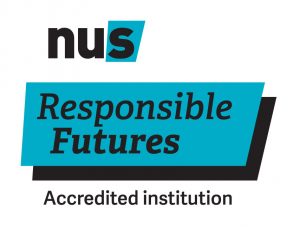Overview
SOS-UK is an education charity (student led) that focusses on sustainability. Through their work they are trying to encourage students to be leaders on sustainability, have it embedded throughout education and make it inclusive so every group has a voice. They run a number of projects to engage universities and students in sustainability and here at DMU we have been working on their Responsible Futures project.
Responsible Futures is a programme to embed sustainability across all aspects of student learning and the University. The programme is a comprehensive approach to embedding sustainability into teaching and learning and addresses this across three areas:
- Formal curriculum – taught curriculum including lectures, seminars etc
- Informal curriculum – volunteering, university trips, placements
- Subliminal curriculum – what do student experience and learn during their time on campus
As part of the program universities must agree to form a Partnership with their students’ union and agree to work through a structured online portfolio of criteria which address these three areas of learning. The portfolio is broken down into eight areas which includes partnerships and planning, leadership and strategy, policy and commitments, interventions and impacts and outcomes. The Partnership works through the criteria to complete as many as possible and then invite the SoS to complete the external assessment of the work.
The external assessment of the Responsible Futures involves the university recruiting student volunteers, who are then training by the SoS to complete an external audit of the progress that the Partnership has made in embedding sustainability in its teaching and learning. This approach provides the external assessment of the program and engages DMU students in the work around embedding sustainability into teaching and learning.
DMU joined the Responsible futures program in 2018. We have been accredited once previously in 2019 and have been able to do so again this year. To keep our accreditation, we need to progress and improve our projects each year before being audited again in two years time.
Audit
DMU’s audit took place on the 10th and 11th March 2021. To gain the reaccreditation you need to achieve at least 200 points out of 300 across the 45 criteria (3 of which where self-defined criteria allowing for the ability to earn an extra 30 points).
Across the two days students were trained on how to review and assess our application. This was done through documentary evidence reviews, interviews (2 staff members, 2 student doing internships with the sustainability team) and Focus groups.
Our results:
The table breaks down the criteria scores and how we did with the evidence we provided. Our final total was 260.0 and we managed to get 24 out of 30 for the self-defined criteria. Having this clear breakdown is extremely useful for us because we can identify the sections that we need to put more work into over the next two years before our next assessment. Along with the table there was a breakdown of criteria and written feedback from our student auditors. This feedback is extremely useful for our sustainability work. Not only will it help with Responsible futures, but it has given us feedback on how well our current projects are doing, do they reach the students and what ways we could embed sustainability even further into our university.
Student auditor overarching feedback on Responsible Futures:
- “It is clear the everyone involved in integrating the sustainability agenda is committed and passionate about it and are doing their best to provide staff and students a range of opportunities to be involved as well.”
- “The partners seem committed and passionate about the agenda and they have all mentioned some of the things they have done, and they will do to continue to sustain the agenda like communication and advertising.”
- “Responsible Futures serves as a great motivation and provides a useful structure. I believe this program has an amazing positive impact on DMU becoming more sustainable.”
Overarching recommendations from the student auditors:
- “Overall, they should focus on involving more student and staff. This will make the job easier and better.”
- “I think DMU has come a long way and is doing very good. It would be nice to see sustainability being part of the core values in more societies.”
- “It’s been great to see what DMU are doing around sustainability, but it would be nice for it to be more visible.”
Collaborative opportunities
Being a part of responsible futures gave the university the opportunity to take part in the Host Partnerships. De Montfort University (DMU) and the University College of Estates Management (UCEM) put on several events both separately and together discussing sustainability in the university setting. The aim was the share our knowledge with other universities both staff/students about some of the work we do around imbedding sustainability. In total DMU ran 3 events. These were a talk given by Decolonising DMU about the work and how they got the project started. A student led event (this was a joint event with UCEM) student representatives from both universities discuss their experience with sustainability at university, their vision and how they got involved. UCEM is an online university so the event was able to provide a look at different student experiences having learning in person or online. The final event was a support session for other universities to ask DMU about responsible futures. This opportunity was to help other universities who are looking at joining the program, have just joined or are looking for new ideas on how to improve their own responsible futures application.
Antonia Hayward Sustainability Advocate


Leave a Reply